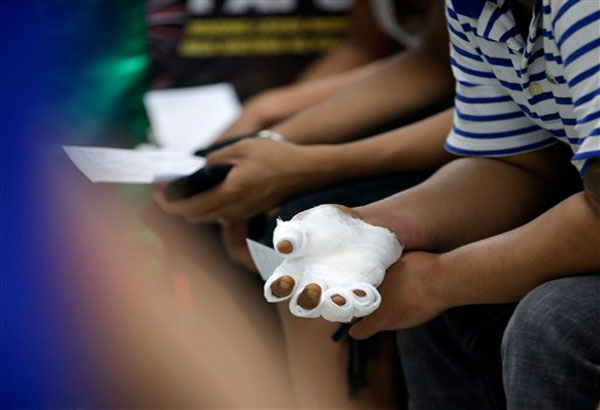‘Talks between Japan, China may be harmed by Chinese provocations’
MANILA, Philippines - The prospect of continued communication between diplomatic authorities in Japan and China could be harmed by Chinese provocations despite signs of pursuing a dialogue, the Japanese embassy said yesterday.
Minister Setsuo Ohmori of the Japanese embassy said the Japanese government’s basic position on the dangerous action taken by a Chinese Navy vessel toward a Japanese Self-Defense Force vessel on Jan. 30 is non-confrontational.
“Japan, as a responsible stakeholder, will continue to deal with the situation in a calm manner from a broad perspective,†Ohmori said.
The embassy issued a position paper entitled “Japan-China Relations Surrounding the Situation of the Senkaku Islands†and called on China to demonstrate its diplomatic approach of “peacefully dealing with issues†through its own actions.
“Japan is deeply concerned that the environment for continued communications between diplomatic authorities in the two countries could be harmed, despite recent high-level political engagements during which China’s leader referred to the importance of nurturing a positive environment for Japan-China relations,†the paper said.
“It is extremely regrettable that China resorts to unilateral provocations while there are signs of dialogue between Japan and China.â€
Tokyo urged China to return to the principle of the mutually beneficial relationship based on common strategic interest, and exercise self-restraint to avoid escalating the situation.
The paper said Chinese provocation in the waters near the disputed Senkaku Islands, which China calls Diaoyu, has become increasingly intense, noting that “China’s intention to topple the status quo concerning Japan’s valid control by coercion is clear.â€
During the period between Sept. 11, 2012 and Feb. 6, 2013, Japan claimed that Chinese government vessels passed through Japanese territorial waters off the coast of the Senkaku Islands nearly daily, except during poor weather caused by typhoons.
“They have intruded Japanese territorial waters 25 times using a total of 83 vessels. The vessels sometimes stay in the Japanese territorial waters for several hours,†according to the paper.
The Japan Defense Ministry said a Chinese Navy vessel directed the weapons-guiding radar to an escort vessel of the Japanese Maritime Self-Defense Force in the East China Sea last Jan. 30.
The paper said that “such a provocative act risks causing an unforeseen incident, and is extremely regrettable.†Japan has lodged a protest to China and strongly urges China to prevent such incidents recurring.
Tokyo said China continues to take provocative actions, attempting to change the existing order through coercion and intimidation, citing Chinese government vessels that intruded into Japan’s territorial waters surrounding the Senkaku Islands for the first time in December 2008, which surprised and raised concern among the Japanese.
These actions contributed to public support for a plan to purchase the Senkaku Islands by the former Tokyo governor Shintaro Ishihara.
In an effort to avoid any negative impact on the bilateral relations by such a move, the Japanese government purchased three of the Senkaku Islands in September last year.
“In this sense, the current escalation dates back to the Chinese action in December 2008,†the paper said.
Following the purchase of the three islands by the Japanese government, Tokyo said Chinese government vessels have made repeated intrusions into Japan’s territorial waters. The situation in the waters surrounding the islands became even more tense on Feb. 4, 2013 when China’s intrusion into Japan’s territorial waters lasted more than 14 hours, the longest period yet.
Tokyo pointed out that China committed another provocative act on Dec. 13, 2012 when a Chinese State Oceanic Administration aircraft intruded into Japan’s airspace by flying over the Senkaku Islands.
Japan took the countermeasure of scrambling jets from Air Self-Defense Force in accordance with domestic laws, which is a standard operational procedure widely recognized in the international community when countering an airspace incursion by a foreign aircraft.
“Japan’s basic position that the Senkaku Islands belong to Japan is unshakable. At the same time, Japan, as a responsible stakeholder of the region, will deal with the current situation in a calm manner from a broad perspective. Japan is ready to maintain close communications with China in an effort to ease tensions.â€
As China repeatedly raised Japan’s war record in the current dispute, Tokyo said that based on the national policies that Japan has consistently maintained after World War II, “Japan, as a peace-loving nation, will continue to contribute to peace and prosperity in Asia.â€
- Latest
- Trending
































